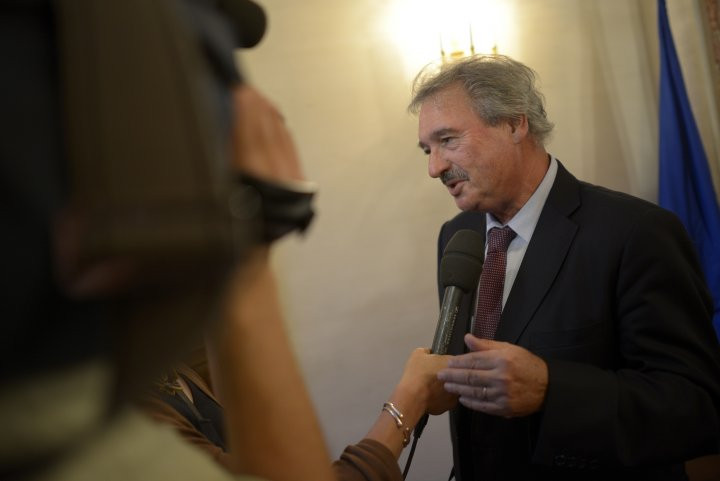As expected MEP Viviane Reding gave a positive assessment, describing the speech as “realist and concrete.” She also noted that Juncker got a standing ovation in the European parliament, which does not happen very often.
Bettel recalcitrant to share the optimism
It was perhaps no surprise that Xavier Bettel, who succeeded Jean-Claude Juncker as prime minister of Luxembourg after snap elections in 2013, dampened the mood. After all, Juncker proposed removing the unanimity vote in certain areas of taxation, a sensitive topic for any Luxembourg politician.
Luxembourg’s prime minister bristled at many core proposals of the speech: Bettel was against the creation of a European finance and economy minister who would also be vice-president of the European commission and president of the Eurogroup. He insisted that the Eurogroup was the council of national eurogroup finance ministers and the commission should not interfere—it was a national competence: “here, the commission is far from reality.”
The DP prime minister was also against Romania and Bulgaria entering Schengen, and he argued that Juncker wanted to accept many countries in the Euro. He said that the countries were not ready yet. In the state of the union speech, Juncker had only said that it should be a goal to include all member states in the common currency, and that he planned to create a euro-accession Instrument, offering technical and even financial assistance.
The prime minister seemed to take issue with the optimistic approach of Juncker, who called on the EP and member states to “sail with the winds” and instead argued that “we should rest after Brexit. People want a European union that works, not saying that the bigger we are, the better.”
Bettel also criticised that there was nothing on digitisation in the speech.
Asselborn welcomed optimistic speech
Jean Asselborn, who was already foreign affairs minister under Juncker, welcomed the “pro-active and optimistic” speech. Juncker had recognised it was important to ease the tensions between East- and Western Europe.
He added that Juncker’s statement that the goal should be to get all member states to adopt the common currency did not mean that they will all become members tomorrow. The Commission will rightly create an incentive so that progress is quicker. Asselborn said that Bulgaria and Romania should indeed become members of Schengen, and Croatia at a later point as well.
“What I liked most about the speech, is the call to take advantage of the good economic outlook, and of the results of the French, Austrian and Dutch elections, to spread optimism.”
Asselborn added that “there must now be a debate on merging the commission president and of the European council, and on the issue of transnational candidate lists for European elections.”
Turmes: climate change missing
Luxembourg’s Green party member of the European Parliament said that it was one of “Mr Juncker’s best speeches.”
Claude Turmes supported the president of the commission on refocusing the industrial strategy and especially the European automobile industry towards new technologies. He also favoured the proposal to create a common European labour authority and the call for more fairness in taxation.
However, Turmes was disappointed that climate, the environment and agricultural policies are not priorities.
